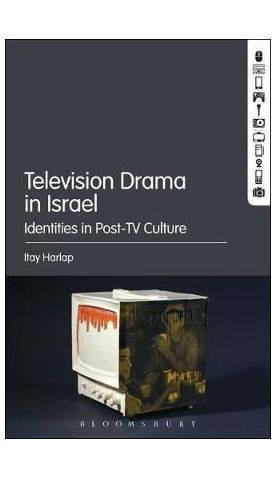אנו משתמשים ב-Cookies כדי לשפר את החוויה שלך. כדי לקיים ההנחיה החדשה של e-Privacy, עלינו לבקש את הסכמתך להגדיר את ה-Cookies. קבלת מידע נוסף.
213.00 ₪
Television Drama in Israel: Identities in Post-TV Culture
213.00 ₪
ISBN13
9781501351952
יצא לאור ב
New York
זמן אספקה
21 ימי עסקים
עמודים
224
פורמט
Paperback / softback
תאריך יציאה לאור
18 באפר׳ 2019
Israeli television, currently celebrating fifty years of broadcasting, has become one of the most important content sources on the international TV drama market, when serials such as Homeland, Hostages, Fauda, Zaguory Empire and In Treatment were bought by international networks, HBO included. Offering both a textual reading and discourse analysis of contemporary Israeli television dramas, Itay Harlap adopts a case study approach in order to address production, reception and technological developments in its accounts. His premise is that the meeting point between social trends within Israeli society (primarily the rise of opposition groups to the hegemony of the Zionist-Jewish-masculine-Ashkenazi ideologies) and major changes in the medium in Israel (which are comparable to international changes that have been titled "post-TV"), led to the creation of television dramas characterized by controversial themes and complex narratives, which present identities in ways never seen before on television or in other Israeli mediums.
| עמודים | 224 |
|---|---|
| פורמט | Paperback / softback |
| ISBN10 | 1501351958 |
| יצא לאור ב | New York |
| תאריך יציאה לאור | 18 באפר׳ 2019 |
| תוכן עניינים | List of Figures Preface Acknowledgements 1. Half a Century of Israeli Identities Through Television Before Television Television Aleph (A), or the Period of Single-Channel Consensus Television Beit (B), or the Period of Channel 2's Dominance Television Gimel (C) or Israeli Post-Television 2. Bringing Back the Nation: BeTipul's Male Warrior Trauma, Zionism, and masculinity Dan Halutz and the trauma of the victimizer Menachem Yerushalmi and the working through of trauma Uri Kahana and the trauma of heterosexual masculinity 3. It's Not TV, It's BeTipul: Rethinking `Israeliness' BeTipul: Text and context `BeTipul is symbolic of Israeli society' `BeTipul is a controversial series' `BeTipul is not regular television' `BeTipul is produced by talented creators' `BeTipul is psychologically profound' Conclusion, or The Text Also Speaks 4. Bad Television/Good (Post) Television: Aging and Masculinity in Nevelot [Eagles] Old Age and the Bad Object Television as Bad Object Nevelot as Good Object 5. Small-Screen Trauma: Seriality and Post-Trauma in Parashat HaShavua and Waltz With Bashir Shaul the Dreamer Between Parashat HaShavua and Waltz With Bashir Second Season, Tenth Episode, Last Scene 6. `Black Box': Memory, Television, and Ethnicity in Zaguri Imperia Twenty Years On: Sh'chur and Zaguri From `Dancers Dancing in the Snow' to `Habibi Diali' `All But the White Foam': Television and Memory Conclusion, or `What's the Moral of the Story?' 7. The New Normative: Gay Fatherhood on Israeli Television From Criminals and `Sick People' to Gay Fathers Normative Gay Parenting on Israeli Broadcast Television Ima VeAbbaz (Mom and Dads) 8. Conclusion and Some Observations on Israeli Reality TV References Television Film |
| זמן אספקה | 21 ימי עסקים |



Login and Registration Form